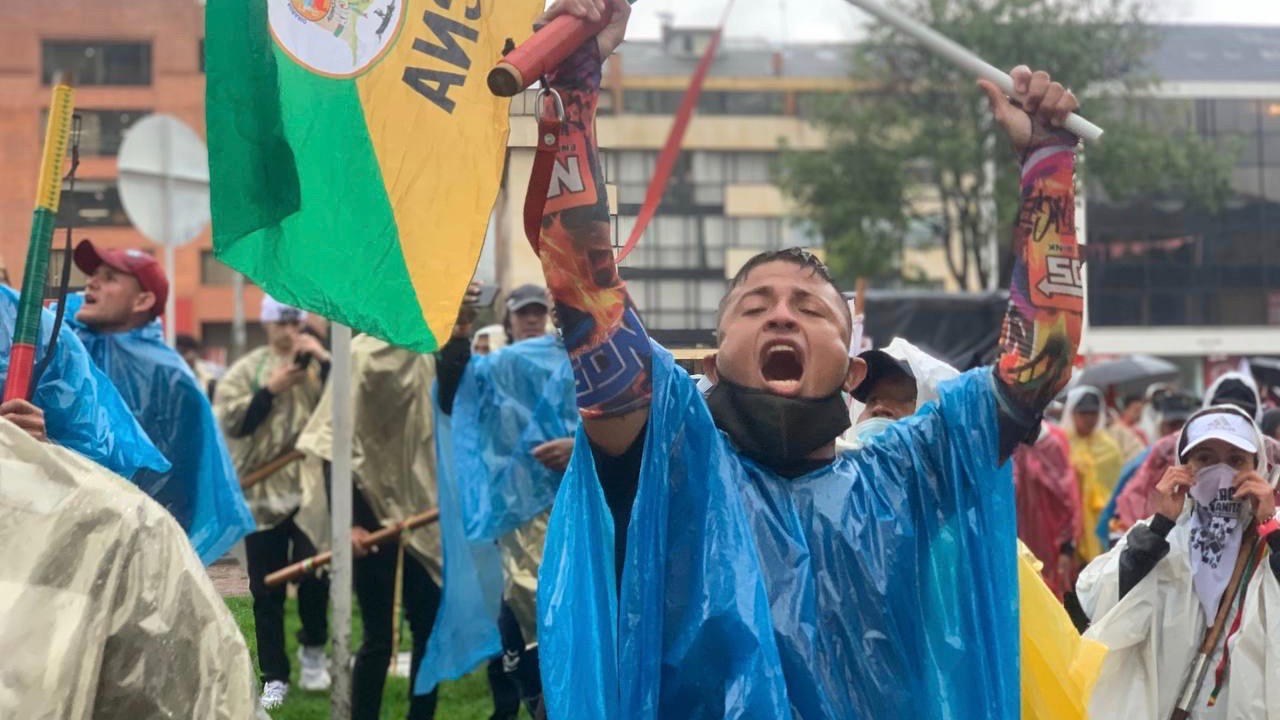Paramilitary violence continues to take lives and wreak havoc in Colombia. According to the Institute of Development and Peace Studies (INDEPAZ), in the first four months of this year, 64 environmentalists, land defenders, human rights defenders, Afro-descendent, Indigenous, peasant and social leaders were assassinated in different departments of the Latin American country by illegal armed groups. Only during the last week, three social leaders were killed, one former combatants of the Revolutionary Armed Forces of Colombia (FARC) guerilla group was murdered and one massacre was perpetrated.
On May 1, Indigenous guard and environmentalist Luis Tombé was shot dead in the Miranda municipality in the Cauca department. Tombé was killed at the hands of the police and officials of the Anti-Disturbance Mobile Squadron (ESMAD). On Sunday, the police arbitrarily arrested several members of the Çxhab Wala Kiwe Indigenous community, who were carrying out the process of Liberation of Mother Earth in the Las Palmas community farm occupied by sugarcane agri-businessmen. The Liberation of Mother Earth is a political process of resisting the dispossession and displacement of Indigenous people from their ancestral lands. It is also an ecological process in which farms are taken over to defend the land against abuses of chemicals and monocultures. In response to the arrests, members of the community went to the police station to demand their release. Security officials opened fire on the people, killing Tombé and severely injuring two others. The Association of Indigenous Councils of Northern Cauca (ACIN) rejected the attacks by public forces against the liberation process, demanded “respect for the life and rights of Indigenous people and cessation of such acts of state terrorism.”
On April 30, renowned Indigenous leader Yesid Caña was assassinated in the Caldono municipality in Cauca by unidentified armed individuals. Caña was a member of the Regional Indigenous Council of Cauca (CRIC). He had participated in various community activities and controls that allowed the seizure and destruction of several shipments of marijuana in the department, actions that made him an enemy of the paramilitary and drug-trafficking groups. He was also a craftsman, and had made the world’s largest woven bag to commemorate the 50th anniversary of the CRIC. The CRIC condemned his murder and demanded justice.
On April 25, the president of the Community Action Board of the Esperanza village, Erminson Rivera, was murdered in the Cantagallo municipality in the Sur de Bolívar department. Just after midnight, heavily armed men entered Rivera’s home and kidnapped him and his brother-in-law, José Obdulio Sánchez, and later killed them in the nearby area.
The same day, ex-FARC guerilla fighter Juan José Chilito was also killed in the Puerto Guzmán municipality in the Putumayo department. He was part of the reincorporation process. With his assassination, the number of ex-combatants killed reached 18 in 2022 and 317 since the signing of peace agreements in November 2016. The Comunes Party, which emerged after the disarmament of the FARC as a part of the peace agreements, condemned his murder and emphasized that “the full implementation of peace agreements is vital.”
In addition to these assassinations, on April 30, three peasant brothers were massacred in their home in the Bolivar municipality of the Cauca department by a group of armed men. It was the 37th massacre of the year. According to INDEPAZ, between January and March 2022, over 130 people had been killed in these 37 massacres.
Last week, on April 27, over 1,500 representatives of various Indigeneous organizations from different cities of the Chocó, Cauca, Valle del Cauca, Norte de Santander and Córdoba departments arrived in the capital Bogota. They came to draw attention to the worsening of the armed conflict in rural areas throughout the nation and the humanitarian crisis it causes. The representative condemned the inaction of the right-wing government of president Ivan Duque.
On April 28, on the anniversary of the April 2021 national strike, they demonstrated outside the Ombudsman’s Office, demanding cessation of the paramilitary violence and the forced displacements of communities. They also marched to the UN Human rights office to call attention of the international community to their situation.
🚨🚨🚨 La Defensoría no abre sus puertas para las y más de 1.500 líderes sociales que se encuentran en la Audiencia Nacional Popular bajo lluvia en la entrada de sus instalaciones #EmergenciaHumanitaria pic.twitter.com/7G8ZCSKZRT
— Coordinador Nacional Agrario | CNA-Colombia (@CNA_Colombia) April 28, 2022





